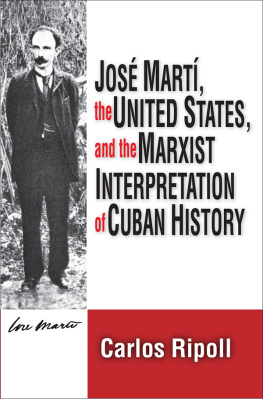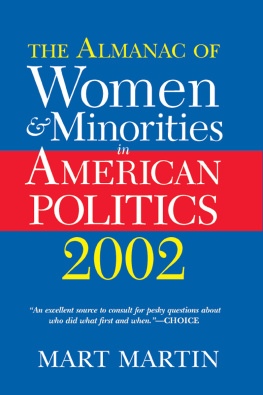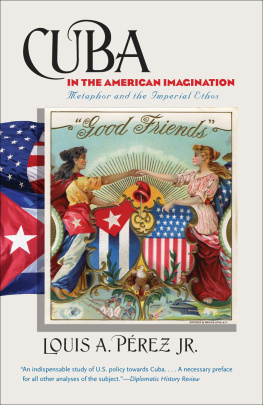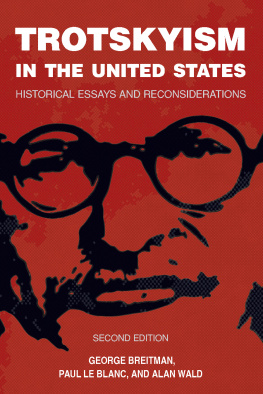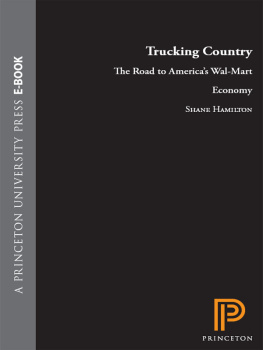First published 1984 by Transaction Publishers
Published 2017 by Routledge
2 Park Square, Milton Park, Abingdon, Oxon OX14 4RN
711 Third Avenue, New York, NY 10017, USA
Routledge is an imprint of the Taylor & Francis Group, an informa business
All rights reserved. No part of this book may be reprinted or reproduced or utilised in any form or by any electronic, mechanical, or other means, now known or hereafter invented, including photocopying and recording, or in any information storage or retrieval system, without permission in writing from the publishers.
Notice:
Product or corporate names may be trademarks or registered trademarks, and are used only for identification and explanation without intent to infringe.
Library of Congress Catalog Number: 84-5971
Library of Congress Cataloging-in-Publication Data
Ripoll, Carlos.
Jos Mart, the United States, and the Marxist interpretation of Cuban history.
Includes index.
1. Mart, Jos, 1853-1895Political and social views. 2. United StatesHistoryPhilosophy. 3. CubaHistory Philosophy. I. Title.
F1783.M38R528 1984
972.91050924
84-5971
ISBN 13: 978-0-87855-976-3 (pbk)
The author gratefully acknowledges the following publications for permissions to use previously published material;
An Introduction to Jos Mart appeared as the Introduction to Jos MartThoughts/Pensamientos: A Bilingual Anthology (New York, 1980).
Jos Mart and the American Founding Fathers was originally published in The Hispanic Presence in Florida, ed. Jos A. Balseiro (Miami, 1976).
Jos Mart and the Marxist Interpretation of Cuban History was published as Jos Mart, Inside the Monster and the Marxist Interpretation of Cuban History in World Affairs (Washington, D.C.) 140, no. 3 (1978).
Inside the Monster: Mart and the United States was published as Mart y las entraas del monstruo in Noticias de Arte (New York, January 1982).
Mart and Socialism was a lecture (Mart y el Socialismo) delivered at the second meeting of the Crculo de Cultura Panamericana, in Miami, and was reproduced in Mart y la crtica actual, ed. Elio Alba Boffill (New Jersey, 1983).
Mart Studies and Control of the Cuban Past was especially prepared for this book.
This collection of papers presents my views on several aspects of Jos Marts thought, in particular, his opinions about the United States and diverse forms of government. It also deals with distortions of Martis life and works at the hands of some Marxist writers and politicians and others influenced by them.
The first essay is a general introduction to Mart and his basic beliefs. The second is a summary of Marts thought on democracy. The next three contain examples of distortions of his actions and words in accordance with Marxist-Leninist doctrines. The last focuses on Marts position regarding totalitarian socialism.
The different styles of the papers reflect the different kinds of publications or occasions for which they were written; some were originally lectures, whereas others are broad-brush commentaries or annotated studies. The books unity comes from its subject, Mart, and the consistent purpose of its chapters: to present his thought fully and accurately.
I am grateful to the editors and periodicals that originally published these papers for permission to reproduce them, to the Cuban American National Foundation for its interest in the publication of this book, and to all those who over the years have lent their assistance and encouragement to my studies on Jos Mart.
Jos Mart was an acute observer of the United States, where he lived for some fifteen years, and is considered one of the great writers of the Hispanic world. His importance for the American reader, however, stems even more from the universality and timeliness of his thought.
Mart devoted his life to ending colonial rule in Cuba and to preventing the island from falling under the control of the United States or a regime inimical to the democratic principles he held. With those goals, and with the conviction that the freedom of the Caribbean was crucial to Latin American security and to the balance of power in the world, he devoted his talent to the forging of a nation. Hence the breadth of his work: he was a revolutionary, a statesman, a guide, and a mentor. And because his vast learning enabled him to move comfortably in the most diverse fields, his teaching is rich indeed.
Mart was born in Havana in 1853. At seventeen he was exiled to Spain for his opposition to colonial rule. There he published a pamphlet exposing the horrors of political imprisonment in Cuba, which he himself had experienced. Upon graduating from the University of Saragossa, he established himself in Mexico City, where he began his literary career. His objection to a regime installed by a military coup led him to depart for Guatemala, but government abuses soon forced him to abandon that country as well. After returning to Cuba under a general amnesty in 1878, he joined in conspiracies against the Spanish authorities that once again led to his exile. Banished to Spain, he quickly left for the United States, and then, after a year in New York, for Venezuela, where he hoped to settle, only to have still another dictatorship force him to depart. Mart lived in New York again from 1881 through 1895, when he left to join the war for Cuban independence that he had painstakingly organized. There he died in one of its first skirmishes.
During the years he spent in the United States, Mart analyzed American society with clarity and insight as a correspondent for the most influential newspapers of Argentina, Venezuela, and Mexico. In order to know a country, he wrote, one must study all its aspects and expressions, its elements, its tendencies, its apostles, its poets, and its bandits. This he did, and because of his uncompromising honesty, his chronicles contain both criticism and praise that have sometimes been put to improper use. It was the period when the American experiment in self-government and free enterprise was crystallizing, now strengthening, now undermining moral values. Mart roundly censured materialism, prejudice, expansionist arrogance, and political corruption, and enthusiastically applauded love of liberty, tolerance, egalitarianism, and the practice of democracy. Thus, in October 1885, contrasting the opulence and poverty in New York, he warned his readers: It is necessary to study the way this nation sins, the way it errs, the way it founders, so as not to founder as it does.... One must not merely take the statistics at face value but hold them up to examination and, without being dazzled, see the meaning they contain. This is a great nation, and the only one where men can be men, but as a result of conceit over its prosperity and of its inability to satisfy its appetites, it is falling into moral pygmyism, into a poisoning of reason, into a reprehensible adoration of all success.
Marts thought has ethical foundations: as a political theorist and artist he can be understood only in terms of his faith in morality. Every inquiry into the nature of man and his role on earth led Mart to identify good with truth. For him there was no force behind what he considered right unless it had the strength of truth. He believed that every human being has within him an ideal man, just as every piece of marble contains in a rough state a statue as beautiful as the one that Praxiteles the Greek made of the god Apollo. To attain the salvation of man the only thing needed, he felt, was to free man from apathy and egotism.

